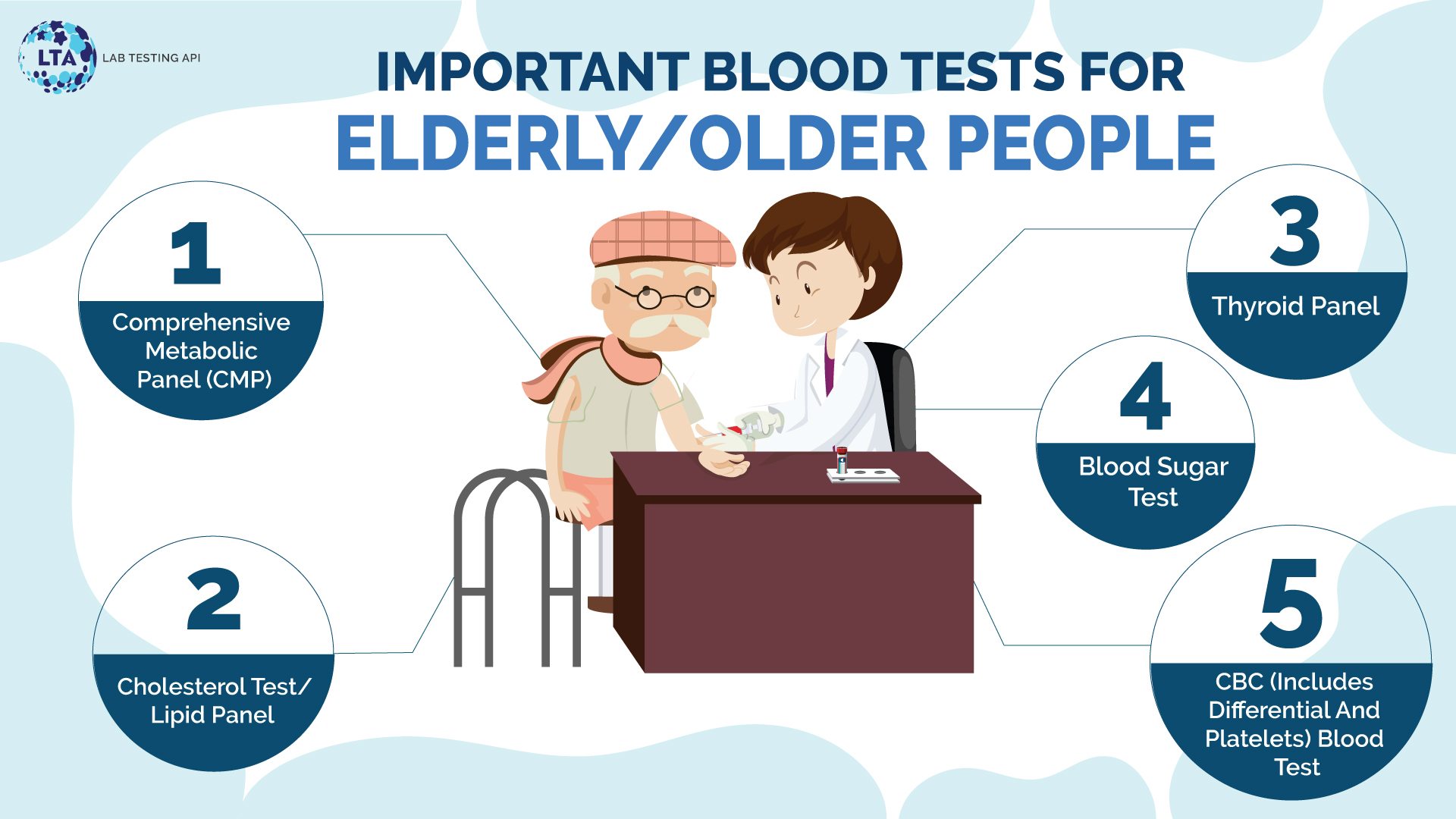
Aging is a part of human life. Human life starts with birth, then it enters the stages of childhood, adolescence, adulthood, and finally old age. Aging is an inevitable and irreversible process. It is estimated that elderly people account for about 12 percent of the world’s population–and this is rapidly increasing to over 22 percent by 2050 (1). As we grow older, a wide range of changes happens in the body to varying degrees, which could result in different health issues. According to the World Health Organization (WHO), people 60 years old and above are referred to as older or elderly persons (2). People of this age group usually have high chances of developing diseases and preventive health care (PHC) is highly recommended for them. To put it accurately, prevention is better than cure.
There are 10 simple blood tests that are suggested for elderly people when they visit their health care practitioner. Other tests may also be recommended by their doctor based on the personal health profile (PHP). So, during one’s regular check-up, if their doctor hasn’t suggested one or more of these blood tests, they should request a lab order that has the following tests.
Disclaimer: The author wants to put a disclaimer that various authors, agencies and authorities including The U.S. Preventive Services Task Force (USPSTF), have recommended various screening tests for elderly people. Though, there is consensus in many areas, yet it is not reflected in all the tests. Therefore, it is highly recommended that while discussing preventive health care with your doctor and making decisions about lab testing, it is imperative to consider one’s specific health situation and risk factors.
This blog is a two-part series. This part talks about 5 tests, the rest of the tests are discussed in the second part. So stay tuned for our next post…. To be continued….
Old age is often associated with failing health and regular blood work can help doctors check on an older person’s electrolytes, information related to infection, kidney function, and much more. A CMP blood test usually measures 14 different substances in the blood and provides significant information about your body’s chemical balance and metabolism.
A CMP includes tests for the following:
One may need this test as part of a routine check-up or when they are being monitored for a specific condition like hypertension or diabetes or are taking medications that may affect their kidney or liver.
Glucose is a type of sugar the body uses for energy. Calcium is an important mineral and is required for the proper functioning of nerves, muscles, and heart. Protein tests including Albumin, Total Protein, Albumin/Globulin Ratio are used to measure the number of proteins in the blood as they are imperative building blocks of all cells and tissues and are crucial for the overall growth and development of the body. Sodium, potassium, carbon dioxide, and chloride are electrolytes, which help regulate the body’s fluid levels and its acid-base (pH) balance. BUN/Creatinine Ratio, Creatinine with GFR, and Urea Nitrogen tests are required to assess kidney function. ALP (alkaline phosphatase), ALT (alanine transaminase), and AST (aspartate aminotransferase) are different enzymes made by the liver and part of the CMP panel. Bilirubin is a waste product produced by the normal breakdown of red blood cells. This is used to evaluate a person’s liver function or to screen for or monitor liver disorders. If CMP-14 test results are abnormal or one may have a combination of abnormal levels, it may mean there is a health problem, like diabetes, liver disease, or kidney disease. Further tests need to be taken to confirm or rule out specific conditions.
Growing age contributes to several health issues like weakness, fatigue, or bruising. The doctor may recommend a Complete Blood Count Blood Test to monitor the overall health and evaluate the cells that make up the blood.
Several features of the blood are measured in the Complete Blood Count.
The Red blood cell evaluates:
The CBC blood test also provides important information on various red blood indices including:
White blood cell tests:
White blood cells (WBC) count: It defines the total number of white blood cells in your blood sample. WBC helps your body fight against infection. A CBC measures the number and five types of white blood cells present (neutrophils, lymphocytes, monocytes, eosinophils, and basophils).
Platelet tests:
Complete Blood Count (CBC) is usually a part of the yearly physical exam, but based on age and other factors, a doctor must be consulted to confirm how often one should get tested.
Maintaining a good blood count is a great indicator of overall health and detects a variety of diseases and conditions, such as infections, anemia, and leukemia. Any increase or decrease in cell counts can indicate an underlying medical problem. An assessment of total blood count may also be done to keep track of an existing medical condition or treatment.
Diabetes is a serious disease and according to one study, 25% of adults aged 65 or older have diabetes (3). People become diabetic when the glucose (sugar) level in their blood increases.
High levels of blood sugar in the body is an indicator that one’s body has an impaired ability to either produce (type-1 diabetes) or respond to the hormone insulin (the hormone that moves sugar into the cells to be used for energy)(type-2 diabetes). It might also suggest that one might be pre-diabetic, a situation where blood sugar levels are higher than normal but not high enough to be called diabetes. The condition raises the risk of type 2 diabetes, heart disease, and stroke in future.
Older adults are more likely to develop type 2 diabetes, because with growing age, our bodies are not able to process sugars. The chances of getting type 2 diabetes increases with obesity, lack of activity, and a family history of diabetes. A blood sugar test measuring the level of glucose (sugar) in your blood is usually monitored with a simple blood test that gives you a result called your A1c level.
Normally, blood sugar/glucose levels should be checked on a regular basis to monitor blood sugar levels. It is recommended that fasting glucose level or Hemoglobin A1c (HbA1c) (an average amount of glucose in the blood over the last 2 to 3 months), be checked once a year; more often if a person’s blood pressure is high (1). In cases of older adults, it is often recommended to aim for a more frequent A1c measurement compared to younger adults. However, it should be discussed with your doctors thoroughly before coming to any decision.
According to the Centers for Disease Control and Prevention (CDC), it is important to control the blood glucose levels as high blood sugar (hyperglycemia), if left undiagnosed and further untreated, can become severe and lead to serious complications requiring emergency care, such as a diabetic coma. In the long term, persistent hyperglycemia, even if not severe, can lead to complications affecting the eyes, kidneys, nerves, and heart.
Cholesterol is a waxy, fat-like substance found in the blood and every cell of the body. Some amount of cholesterol is needed to keep the cells and organs healthy. There are two main types of cholesterol: low-density lipoprotein (LDL), or “bad” cholesterol, and high-density lipoprotein (HDL), or “good” cholesterol. According to healthline.com, cholesterol levels increase with age. Additionally, men are generally considered at a higher risk than women for having high levels of cholesterol.
A cholesterol test helps measure the amount of each type of cholesterol and certain fats (triglycerides) in the blood. The cholesterol test is also known as the Lipid Panel/Lipid Profile test.
High cholesterol levels are considered the major reason behind heart attacks and strokes, which are more common in older people. It’s vital for older people to check their levels of total cholesterol, HDL “good” cholesterol and LDL “bad” cholesterol, regularly. According to Harvard Medical School, women who are at increased risk for heart disease or who have diabetes should get tested at least once a year. Additionally, tests should be done frequently by those who are obese or who drink or smoke.
Elevated cholesterol or triglyceride levels may put one at risk for heart disease and other serious conditions. High LDL levels in the blood can lead to a build-up of fatty substances that eventually narrows the arteries and blocks blood from flowing normally. When blood flow to the heart is blocked, it can cause a heart attack. On the other hand, when blood flow to the brain is blocked, it can lead to stroke and peripheral artery disease (PAD).
Thyroid tests help evaluate thyroid gland function and further help diagnose and/or monitor the treatment of thyroid disorders.
Several studies revealed that thyroid illness/thyroid abnormalities increases with age and it often goes un-diagnosed (4).
If the thyroid gland does not produce enough T4 and T3 (underactive thyroid), due to thyroid dysfunction, one may experience symptoms such as weight gain, lack of energy, and depression. This condition is called hypothyroidism. If the thyroid gland produces too many hormones, one may experience weight loss, high levels of anxiety, tremors, and a sense of being on a high. This is called hyperthyroidism. Hypothyroidism (under-active thyroid) is the more prevalent thyroid condition in people over 60 years of age and gradually increases with age. Thus, the detection and regular monitoring of the same is recommended.
A thyroid panel is a group of tests that includes TSH (thyroid-stimulating hormone), Free T4 (thyroxine), Free T3, or total T3 (triiodothyronine), Thyroid Peroxidase, and Thyroglobulin Antibodies.
TSH (thyroid-stimulating) is a pituitary hormone that is part of the feedback system of the body that controls thyroid hormones. This is usually the first test the doctor will do to check for thyroid hormone imbalance.
T4 (thyroxine) and T3 (triiodothyronine) tests are used to determine hypothyroidism (underactive) or hyperthyroidism (overactive thyroid). T3 and T4 are the two important hormones secreted by the thyroid gland. Nearly all the T4 and T3 found in the blood is bound to protein. The rest is unbound (free/active) and is able to enter and affect the body tissues. In addition to T4 and T3, the test also measures the amount of free (unbound) T4, free (unbound) T3, or the total T3 (bound plus unbound) in the blood.
Thyroid antibodies: The test also helps detect different types of autoimmune thyroid conditions. Important thyroid antibody tests include microsomal antibodies (also known as thyroid peroxidase antibodies or TPO antibodies), and thyroglobulin antibodies (also known as TG antibodies). Detection of the same is very helpful in determining the cause of thyroid problems.
People over the age of 60 must talk to their doctors about getting tested. Also, one should get checked if having symptoms of hypothyroidism or hyperthyroidism.
According to Harvard Medical School, the various signs and symptoms of thyroid disorders in older people include increases in cholesterol levels, bowel movement changes, fluttering of the heart or more severe- heart attack, pain in joints or muscles, constipation, weight gain, hearing loss, sleepiness, and psychiatric issues like hallucinations.
Written by Dr. Shikha Sharma, Reviewed by Dr. Harshi Dhingra
